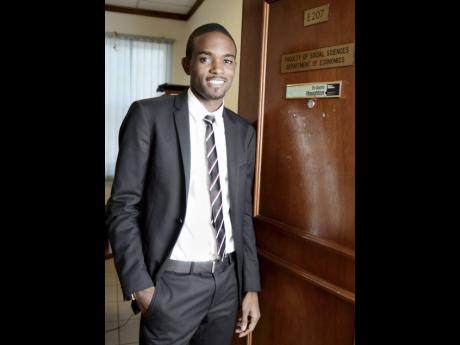Gas tax cut was better bet, says Haughton
There have been mixed reviews of the recent announcement by the Government that general consumption tax (GCT) will be reduced by 1.5 percentage points to 15 per cent for the 2020-21 financial year, which begins on April 1.
The GCT cut is expected to save Jamaicans close to $14 billion out of the more than $155.2 billion that was projected to be raked in if it had remained at 16.5 per cent.
Last November, People’s National Party (PNP) President Dr Peter Phillips recommended a two per cent cut in GCT to help alleviate the economic burdens of Jamaicans, but his own senator, Dr André Haughton, rubbished the proposal as unworkable, saying it would have a negative cumulative effect across the board.
Haughton subsequently said that he was not seeking to challenge the position of the PNP.
After Tuesday’s announcement, the PNP welcomed the GCT cut, but in an interview with The Gleaner last week, Haughton, an economist and university lecturer, said that a cut in the gas tax would benefit the people more, especially in light of the COVID-19 pandemic.
“The coronavirus now has put the world in a supply-side crisis. Now in a supply-side crisis, when you give people extra money to spend and you attack it from a consumption-and-demand basis, what happens is that you have too much money chasing too few goods,” said Haughton, who is seeking to represent the PNP in the St James West Central seat.
“So it can be inflationary without achieving the increase in consumption that the Government desires ... . My supply-side approach would be a fall in the gas tax,” Haughton said.
He said that a cut in the gas tax would help reduce costs relating to energy, thereby driving the costs of production to manufacturers and transportation.
Since the COVID-19 outbreak, gas prices have fallen dramatically.
tax more, lower rate
Haughton’s colleague, Dr Peter-John Gordon, economics lecturer at The University of the West Indies, Mona, said that he was in favour of the GCT cut but argued that it would make more sense if the tax were applied to more items and lowered even further.
“So the question is, can you find a lower rate that is applied to everything that has them (the poor) paying the same amount that they would pay if they paid on some items and not on other items? And the reason I’m in favour of that is what really matters in people’s spending decisions is relative prices,” Gordon told The Gleaner.
“By having GCT on some items and not other items, some products are relatively more expensive than others, and therefore, people would be moving away from those items to the other items.”
One of Jamaica’s leading economists, Dr Damien King, said that Finance and the Public Service Minister Dr Nigel Clarke was ill-advised in revising downwards the GCT.
“If they wanted to cut taxes for whatever reason, GCT is the worst one to cut because it is the fairest and most efficient tax. Half the country evades income tax, so that is a much better tax to cut. And cutting import taxes would actually boost the economy more,” King said.

